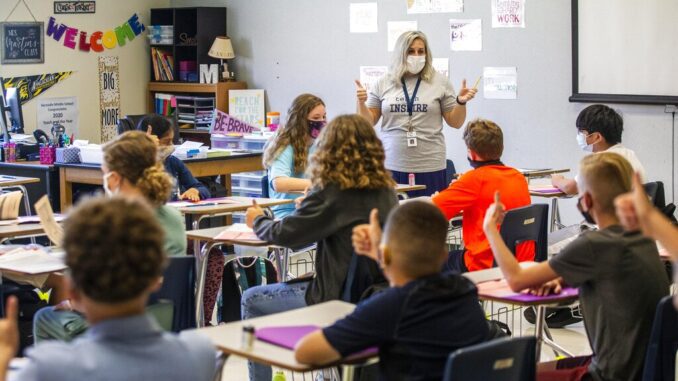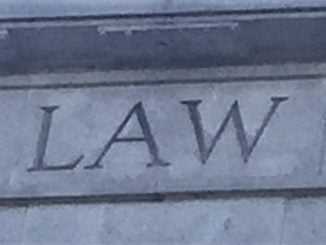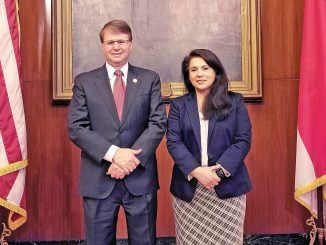
RALEIGH — Oral arguments in the long-running Leandro education case were heard by the North Carolina Supreme Court on Aug. 31.
Presenting to the state’s high court were the plaintiffs’ attorney Melanie Black Dubis, lawmakers’ attorney Matthew Tilley and N.C. Senior Deputy Attorney General Amar Majmundar, who represented North Carolina’s executive branch.
The main question at hand throughout the hearing was whether the courts can bypass the state constitution when it comes to appropriating taxpayer money for education purposes.
“Whether the judiciary can order the state to implement and fund money for a sweeping, eight-year, 146-item, comprehensive remedial plan” that would have ramifications constitutionally and educationally, Tilley questioned.
Referring to Judge David Lee’s funding transfer order, Tilley called it an “unprecedented violation” of the appropriations process the state’s constitution gives to the General Assembly.
“The drafters of the constitution intended the General Assembly to have the exclusive power of the purse,” Tilley said, “in order to ensure that the people, with their elected representatives, had full and exclusive control of the state’s expenditures.”
In his remarks, Tilley also warned “The executive branch is going to be necessarily tempted to use admissions in a court case to get orders that would provide agencies things that they can’t get in the legislative process.
“To impose a remedy, one must first find a violation,” Tilley said in closing statements.
Tilley also questioned what would happen if the justices forced the comprehensive remedial plan’s (CRP) funding to be fulfilled.
“No one says that there can’t be a remedy,” said Tilley. “But it doesn’t necessarily need to include the appropriations power.”
He cited retired Judge Howard Manning’s past statements that the “state must step in with an iron hand and fix this mess” that included suggestions of removing an ineffective superintendent, principal or teachers, or by addressing the lack of effective management or practices.
“There are many things short of an appropriation that a court can do and that this court has not tried,” said Tilley. He later added that “no case from this court has ever countenanced an appropriation by the judiciary.”
Dubis, who has represented the plaintiffs in the case for 25 years, argued that a $1.75 billion funding transfer order issued by Lee last fall should be enforced, claiming that order isn’t by definition an appropriation. She also said various branches of state government had “failed the children” and the “future of the children in North Carolina are in this court’s hands.”
The Court of Appeals blocked Lee’s order on the basis he lacked the authority to direct the three agencies cited in his order to transfer the funds and that the order would create ongoing problems and threaten the separation of powers between the branches of state government.
Attorneys for the lawmaker defendants had argued Lee had no authority for his order and the appropriation of funds rests solely with the legislature per the state’s constitution.
Chief Justice Paul Newby replaced Lee with Special Superior Court Judge Michael Robinson in late March. Robinson ordered participants in the case to submit briefs related to the fund, including the impact state budgets had on the amount ordered by his predecessor. The dollar amount was then lowered to $785 million.
During questioning by Associate Justice Michael Morgan, Dubis was asked what recourse she would like to see the court take.
Dubis responded that the right to a sound, basic education was a “unique right” and that the court is a “co-equal branch of the state,” with a “duty to guard and maintain that right.” She also blamed the legislature alone for failing in its duties and said, “The legislature is not above the law.”
Another main thread borne out by questions from all seven justices was whether or not Lee’s order could be used to apply a statewide remedy in the case.
On multiple occasions, Newby pressed Dubis where there was an actionable order stating a remedy in Leandro should be statewide instead of limited to Hoke County.
Newby referred back to the 2004 Supreme Court ruling specifically limiting the case to the schools in Hoke County. Dubis responded by reciting eight instances from 2005 to 2020 in which judges in the case had claimed a “statewide violation” had occurred. She also pointed to statewide education data received by Lee and his predecessor, Manning, over years.
The involvement legislators had in the creation of the WestEd CRP was also brought up.
Lawmakers have said they were left out of the CRP process, a claim which was mostly confirmed by Majmundar under questioning from Newby.
Newby asked Majmundar if the state had sought to bring in the General Assembly as a necessary party in forming the CRP. Majmundar said no and claimed lawmakers didn’t seem to “have an interest” and lawmakers only intervened “at the last moment.”
Majmundar also disputed any collusion between the plaintiffs and state attorneys related to the CRP, yet a substantial portion of CRP was funded by cabinet agencies answering to Democratic Gov. Roy Cooper.
WestEd was paid more than $2 million to produce the CRP. At least $1.5 million came from nonprofit groups and cabinet agencies. According to news outlet WRAL, the N.C. Department of Health and Human Services paid $604,699 and the Department of Administration paid $200,000. The balance came from the organizations that have expressed support for the Leandro case, including Goodnight Educational Foundation, Z. Smith Reynolds Foundation, Spencer Foundation, Belk Foundation and A.J. Fletcher Foundation.
Before the start of the hearing, protesters held a prayer vigil in support of upholding Lee’s funding order. The vigil was organized by Pastors for NC Children and Every Child NC. Both organizations have ties to the Network for Public Education, a 501(c)3 nonprofit run by education researcher and progressive Democrat Diane Ravitch.
In 2021, Pastors for NC Children received $60,000 for two years of “general operating support” from the Z. Smith Reynolds Foundation.
While the Leandro case was fast-tracked to the N.C. Supreme Court, the justices did not indicate when a ruling would occur.
Two of the seats on the court, both held by Democrats, will be on this November’s ballot. The current makeup of the court is four Democrats to three Republicans. Under the current court, the majority has recently used its position to rule that courts can overturn constitutional amendments.



